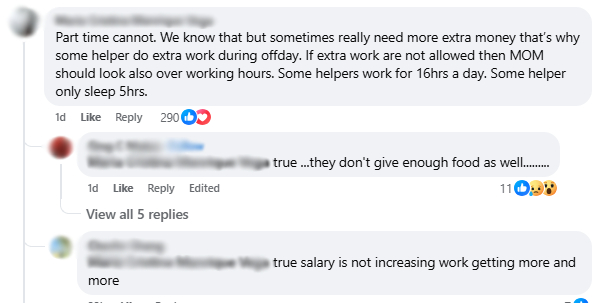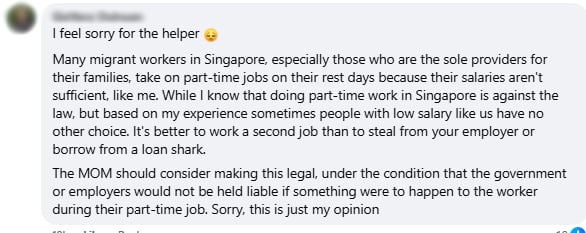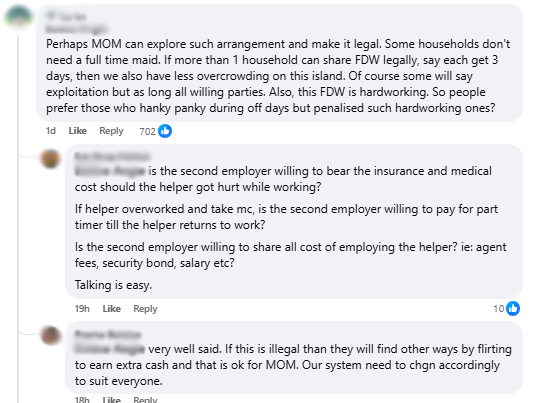A Singaporean woman and a Filipino domestic worker have been fined after the helper was found to be illegally engaged for part-time cleaning over several years.
The Ministry of Manpower (MOM) began investigating in December 2024 following a tip-off about a possible breach of the Employment of Foreign Manpower Act.
Court proceedings revealed that Pido Erlinda Ocampo, a 53-year-old Filipino, had worked part-time for 64-year-old Singaporean Soh Oi Bek over a period of four years.
Although Ocampo held valid work passes as a live-in maid for more than 30 years since 1994, her permits only allowed her to work for her official employers.
On Monday (25 Aug), Soh was fined S$7,000, while Ocampo received a fine of S$13,000.
Ocampo faced additional charges as she had also worked for another employer, recommended to her by Soh.
How the Arrangement Began
In 2018, Soh was looking for a part-time helper and was introduced to Ocampo by a friend of Ocampo’s official employer.
Between April 2018 and February 2020, Ocampo carried out chores at Soh’s residence, including sweeping, mopping, ironing clothes and cleaning ceiling fans.
Each session lasted three to four hours, two to three times a month, and she was paid about S$375 monthly in cash.
Her work paused in February 2020 due to COVID-19 restrictions but resumed in March 2022 when measures were eased, continuing until September 2024.
Although Soh was aware that Ocampo was already employed by another household as a domestic worker, she hired her regardless, telling the court she was “busy and needed someone trustworthy to help her clean her residence”.
Soh later recommended Ocampo to her superior, Pulak Prasad, who was also seeking part-time cleaning assistance.
Ocampo worked at Prasad’s home between September 2019 and February 2020, and again from March 2022 to September 2024.
Her duties included vacuuming, mopping, changing bed sheets and cleaning cabinets.
She typically worked once or twice a month for three to four hours, earning about S$450 monthly when work was required.
When Prasad’s family travelled overseas, Ocampo was not engaged.
Sentencing Considerations
The prosecution noted that the mandatory minimum fine for Soh was S$5,000, usually applied in brief cases of illegal employment with no aggravating factors.
However, due to the lengthy period of offending and a charge taken into consideration, an uplift of S$2,000 to S$3,000 was sought.
Soh’s lawyer argued for the minimum fine, but the judge disagreed, pointing out that the prosecution had already been “quite kind” by compressing the offending period to cover only the months worked, rather than the entire four-year span.
Ocampo submitted a written mitigation plea, though it was not read in open court.
In the end, Soh was fined S$7,000 for one charge, while Ocampo was fined S$13,000 for two charges. Both women paid their fines in full.
Foreign domestic workers who take on unauthorised employment face penalties of up to two years’ imprisonment, a fine of up to S$20,000, or both.
Employers who hire workers without a valid work pass may be jailed up to 12 months, fined between S$5,000 and S$30,000, or both.
Netizens Say Helpers Take Part-Time Jobs Out of Necessity
On CNA’s Facebook page, netizens expressed sympathy for Ocampo, lamenting that the fine was too heavy given her modest income.



Some pointed out that many foreign domestic workers take up part-time jobs during their rest days simply because their regular pay is insufficient.


One user commented: “Many migrant workers in Singapore, especially those who are the sole providers for their families, take on part-time jobs on their rest days because their salaries aren’t sufficient.”

Calls to Legalise Part-Time Work for Domestic Helpers
Many netizens urged MOM to consider allowing regulated part-time arrangements, noting that not every household requires a full-time live-in maid.


One suggested that domestic workers could be permitted to work for another employer one day a week under proper rules such as insurance and levy obligations.

Others said such flexibility could benefit both helpers and Singaporean families.
“Agree to give permission for FDWs to work part time on their off day. This will also help locals, especially the elderly, who need some help to clean their homes once or twice a month,” one user wrote.

Another added: “If more than one household can share an FDW legally, say each gets three days, then we also have less overcrowding on this island.”

One user commented that MOM should improve helpers’ working conditions and pay, and also conduct surprise checks on their living environments to ensure fair treatment.

The post Netizens urge legal part-time work options for foreign domestic workers after S$13,000 fine imposed appeared first on The Online Citizen.


